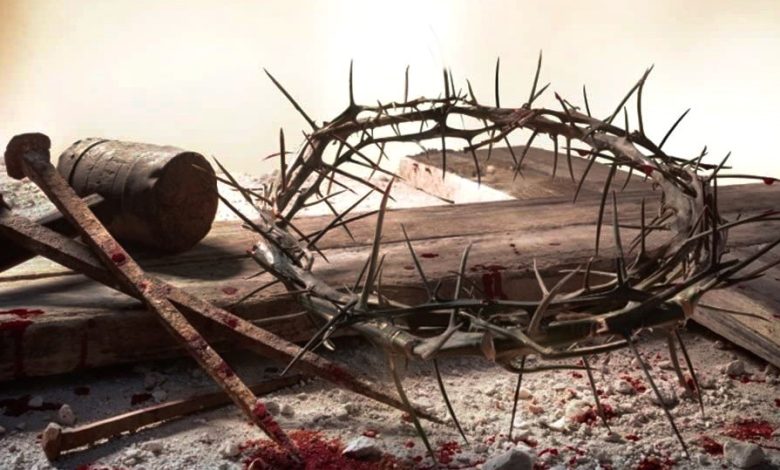What Does the Suffering and Death of Christ Mean to Me?
By Rev Dr David Lee, Maranatha Assembly

This is an insightful, sobering question. Jesus’ death at the cross on Calvary is absolutely the most profound and powerful event ever to occur on earth. It also includes the greatest story ever told. One that stretches our understanding of God and ourselves to the limits. Here, we embark on a journey to discover a significance that is both life transforming and leads to salvation in Christ.
The Questions and the Answers
During the Holy Week, these are the questions that we should all be concerned with:
Why did Jesus die?
What sent Him to the cross?
What was it that motivated Jesus to give up His life to die such a cruel death?
Historically, from a human perspective, the answers are obvious.
Jewish leaders plotted against Him.
Judas betrayed Him.
Herod and Pilate tried Him.
Roman soldiers executed him.
“Wicked men put him to death by nailing him to the cross.” (Acts 2:23).
Spiritually, there is a divine plan for world redemption.
The Divine Plan
Let’s look at what Apostle Paul had to say about it:
“But now apart from the law the righteousness of God has been made known, to which the Law and the Prophets testify. This righteousness is given through faith in[a] Jesus Christ to all who believe. There is no difference between Jew and Gentile, for all have sinned and fall short of the glory of God, and all are justified freely by his grace through the redemption that came by Christ Jesus. God presented Christ as a sacrifice of atonement,[b] through the shedding of his blood—to be received by faith. He did this to demonstrate his righteousness, because in his forbearance he had left the sins committed beforehand unpunished—he did it to demonstrate his righteousness at the present time, so as to be just and the one who justifies those who have faith in Jesus.” (Romans 3:21-26)
Everyone in the world has a spiritual problem. The problem is one of personal sin. I don’t believe there would be much disagreement over the fact that we have all sinned. The vast majority of the human race down through history has not had much trouble admitting the fact that all of us have sinned. The problem of evil and suffering is the central conundrum of Christian theology. Philip Yancey calls it: “The question that will not go away.”
The Sin Issue
Paul said, “For all have sinned and fall short of the glory of God.” (Romans 3:23)
Our sin needed to be dealt with to bring us back to God. It says in 1 Peter 3:18 that Christ died for sins. The Bible does not mince words when it comes to human disobedience and its consequences. Paul also said, “The wages of sin is death.” (Romans 6:23) All humans stand condemned before God. Our sins separate us from the Creator and Supreme Being, who demands holiness and perfect justice.
Sin is no small thing. It is cosmic treason. When we sin against God, we are saying that we don’t care about his laws, don’t care about honoring him, and don’t care about his glory. Sin is the ultimate offense that separates us from God. Grace does not dismiss or diminish the seriousness of sin and its consequences.
When Satan with his wiles managed to deceive Eve and turn Adam to disobedience, sin entered into their nature. This sin came between them and God. Spiritually we are dead in our trespasses and sins. (Ephesians 2:1) Sin had entered the world, which had cursed mankind and all living creatures also had to die a physical death. The sin that entered Adam and Eve’s nature was passed on to all their descendants.
Christ’s Death is the Answer
Jesus died for our sins. The substitutionary nature of Jesus’s death is the key idea for understanding how God deals with sin and offers us forgiveness. To bring us near, Christ died for sins, “the righteous for the unrighteous” (1 Peter 3:18). If “the unrighteous” is all of us, “the righteous” is Jesus himself. The one who knew no sin, became sin (2 Corinthians 5:21)—our sin—so that we might receive mercy.
The New Testament expounded the truth that Jesus died in our place. Jesus paid the price for our redemption when he gave his life “as a ransom in the place of many” (Mark 10:45). Jesus reconciled us to God by bearing our sins himself (1 Peter 2:24). “God presented Christ as a sacrifice of atonement through the shedding of his blood” (Romans 3:25), exhausting God’s wrath against our unrighteousness.
God Provided a Way for Us
God did not wait until we became good enough to get saved. God knew we would never become good enough, so God took the initiative to provide a way for us to be made right with Him through the death of Jesus.
Some people feel they have sinned so much that God cannot possibly forgive them. When a person feels that way, it shows a lack of faith in the power of God to forgive and cleanse a person of sin.
It was out of love that God sent his Son, and the Son laid down his life of his own accord.
It was out of love that God sent his Son, and the Son laid down his life of his own accord. “God was reconciling the world to himself in Christ.” (2 Corinthians 5:19)
Two texts from Romans make this clear: “God demonstrates his own love for us in this: While we were still sinners, Christ died for us.” (Romans 5:8) Christ’s death puts beyond all doubt the fact that God loves us. It assures us that no matter what life throws at us, we can trust that “He who did not spare his own Son, but gave him up for us all—how will he not also, along with him, graciously give us all things?” (Romans 8:32)
Jesus also died to prove the justice of God. God presented Christ as a sacrifice of atonement to demonstrate his justice. (Romans 3:25-26)
Isaiah prophesized concerning Jesus in Isaiah 53:3-5:
He was despised and rejected by mankind, a man of suffering, and familiar with pain. Like one from whom people hide their faces he was despised, and we held him in low esteem. Surely he took up our pain and bore our suffering, yet we considered him punished by God, stricken by him, and afflicted. But he was pierced for our transgressions, he was crushed for our iniquities; the punishment that brought us peace was on him, and by his wounds we are healed.
God doesn’t forgive us by turning a blind eye to our sin or by overlooking it. Forgiveness is costly to the one against whom the wrong has been done. And at the cross we see not only God’s love, but also the seriousness with which he takes our sin.
The Gift of Salvation
This is why we call it grace because it is so amazing. God wants to give to you the gift of salvation today. He is waiting for you to ask for the gift. Some people are too proud to ask for it—please don’t make that mistake.
Through the death of Christ and faith in that death, man was set free from the bondage of sin and allowed to experience the righteousness and fellowship of God for eternity.
Why did Jesus die? Jesus died to bring us back into communion with God. Through His death and our objective faith placed in Him, we receive God’s forgiveness, eternal life and live in the righteousness of God, through life transformation.

Rev Dr David Lee became an Assemblies of God (AG) minister in 1969. He had served in the Executive Committee and held many positions in the development of AG of Singapore. He is currently Senior Pastor of Maranatha Christian Assembly, since 1986. He was formerly General Secretary of Evangelical Fellowship of Singapore and Vice Chairman of Global Day of Prayer.




